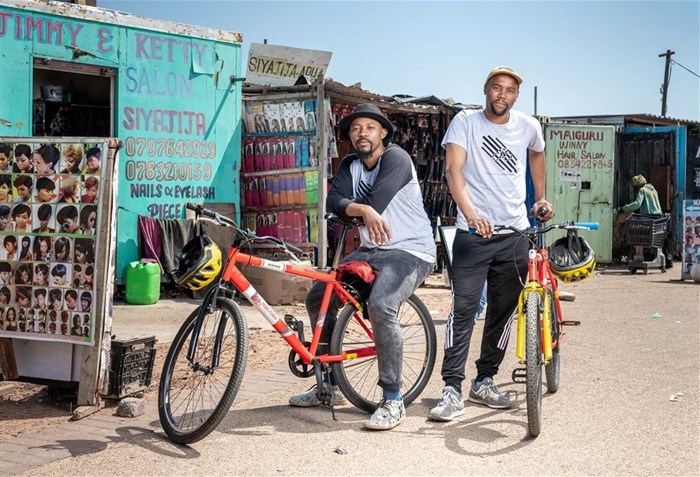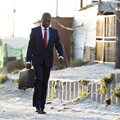Youth unemployment continues to be a massive issue in South Africa. According to StatsSA, the youth unemployment rate in South Africa rose significantly to 58.2% in the third quarter of 2019 from 56.4% in the previous period, reaching its highest level since the first quarter of 2008.

Ayanda Cuba and Buntu Matole. Source: Thom Pierce ©
Recent school graduates who have passed matric face the uncertainty of unemployment as post-school employment opportunities cannot meet the demand, and many matrics won’t have the opportunity to study further. It is clear that now, more than ever, innovative ideas and solutions are needed to tackle this - one of which is becoming an entrepreneur.
For Ayanda Cuba and Buntu Matole, this was their path. After meeting each other at the Raymond Ackerman Academy for Entrepreneurial Development in 2014, the two have since set up and run a successful tourism business in Khayelitsha, Cape Town. The duo also developed Sporting Code, a development organisation aimed at creating sporting experiences for youth in the partially-informal township.
The world of sports teaches soft skills, such as discipline, good teamwork, competitiveness, which in turn, could bring about positive results.
Ayanda Cuba shares his journey with us...
What's Sporting Code all about?
Sporting Code is a sports development organisation that was started in 2015. Our goal was to use sports as a medium or tool to try and create a better sporting experience for the youth in our community. We also understood that over the years the number of young people participating in organised sports started to declined due to different reasons, and because of that, we had grown.
When, how and why did you get started?
It all started through a conversation. Buntu was looking to do some work in his community. We both taught basketball. Seeing that it was a sport that he had grown up playing, I suggested that we try hosting a tournament first and from there we could see what happens.
So, we organised an old school desk from Uxolo Primary School, used a local public parking as our venue and invited friends and other guys from the other communities to join us for our first tournament. The tournament was such a success that people wanted us to host them every month, and we did.
From there, events slowly grew and the next thing we knew we were hosting multiple activities from sports fun days (tournaments), coaching clinics and camps. The more we worked in our community the easier it was for us to build trust with our peers and eventually get assistance from brands and local businesses.
What is the core function of Sporting Code?
The primary function is to create a great sporting experience for the kids in our communities, to work together with sports teams, organisations, schools and government in ensuring that it is able to translate to each and every community.
What are some of the obstacles you've had to overcome since starting out?
In the beginning, everything that we did came out of our own pocket. We had some assistance from friends but it was always a struggle to have that conversation with family members and convince them that what we were doing was important.
Respectfully, it is due to the fact that for our parents, when they were in their 20s, marriage and a job and taking care of their children was what they focused on. So, to them, it was all about being stable.
For us, on the hand, it was about building a legacy, changing our community and being independent in every sense of the word. So, when things started moving and they started seeing the growth, it all began to change and they slowly started embracing what we were doing.
Don`t get me wrong - they were always supportive. It’s just that fear made them question our decision to not want a steady job and rather start our own project. Like us, they knew that everything at the end of the day needs two things: money and resources, and because we lacked both of those things they had to try and be convinced otherwise.
What advice would you give to other aspiring entrepreneurs?
The biggest thing I learnt is that there are no free lunches. You have to put in the work, pay the price in order to get the return. At the start of every business, you need to be willing to push yourself, step out of your comfort and get your hands dirty.
Your biggest investment will be the amount of time you put in working on yourself and your businesses.
 What has been your proudest achievement thus far?
What has been your proudest achievement thus far?Our proudest achievement will always be our first tournament. When we started, we had nothing and having to use something such as a school desk and an open park will always be a reminder to us that we only needed to believe that we are capable of hosting a tournament. It didn't need to be fancy, but just the fact that people were looking for an organised activity to participate in was enough to make it all work.
Everything else that we have done has been great too, from working with netball clubs and hosting a training camp to hiking up with the boys or winning a silver medal with our special school basketball team. We now even work with Airbnb as partners to their Airbnb Africa Academy - an initiative to encourage healthy tourism and entrepreneurship in rural and under-resourced communities across the continent. But had we never hosted that first tournament, none of this would have happened.
What does the future of entrepreneurship look like to you?
The future of entrepreneurship in my eyes is bright. I am always humbled by the fact that more young people are willing to start something. I just hope that they are able to find ways of maintaining and growing their initiatives. Khayelitsha alone as a community has more young people doing amazing things and that's inspiring for the next generation to see people like them succeed.
What do you think is the importance of startup accelerator/incubator programmes?
I think accelerator/incubator programs are good at helping entrepreneurs reflect on their journeys. Through that process, you get to refine and retest your business or your ideas. They create an environment where you are forced to fail fast in order to succeed. I just wish that we had more in the township to help change the business landscape in our communities.
What would you like to see changed in the South African startup landscape?
The South African startup landscape is currently an uneven playing field. Businesses that originate or operate in the township are always five steps behind businesses that are in the main CBD. This is due to a lack of resources and access to tools that businesses in the main hubs have.
What do you believe are the traits an entrepreneur needs in order to succeed?
There are no specific traits.
I just think that an entrepreneur should just open-minded, be willing to fail, be hardworking and be willing to learn.
You don't have to be a futurist like Steve Jobs or well-spoken like Vusi Thembekwayo. In my eyes, the only things that stand out will always be your commitment to the success of your business and the investment that you are willing to do in growing your business and peoples skills.
Tell us about your biggest struggles as an entrepreneur, as well as some major highlights.
I can't lie and say that I personally had big struggles as an entrepreneur. I don't even believe that I even acknowledge that I was an entrepreneur, to begin with. The term alone just came with so much pressure and expectation. I looked at myself as a change catalyst. As a result, I never felt the pressure. Business came first and the work that we were and are still doing was more important. A major highlight was to get to be invited by the head of Cultural Affairs and Sports back when we started in 2015 to go watch the Rugby sevens world cup in Newlands. To be in that space was truly a humbling experience.
Why would you encourage someone to become an entrepreneur?
With South Africa currently having such a high unemployment rate, people need to start finding alternative ways of earning an income. Entrepreneurship is one of those options, however, it's a challenging journey.
As an entrepreneur, our responsibility is to ensure that we start building businesses that have a potential to scale and one day employ, and while we are making money we also have an obligation to ensure that we are always upskilling ourselves so that we can always cope with the changes of our businesses.
 What's next for Sporting Code in 2020?
What's next for Sporting Code in 2020? We are taking some time away from Sporting Code to reassess how we can truly grow both the organisation and its programs. One of the lessons that we learnt from running Sporting Code was that such initiatives like ours create a promise and a level of expectation from the communities that we serve.
So, for 2020 we decided to go back to the drawing board and have a look at the work that we have done in the past. That way, as a team we believe we can draw from our failures and success in order to continue working.
One of our biggest focuses is to work closely with other organisations who have a similar focus as Sporting Code and support them with resources and connections to become better. We won't be doing any tournaments or hosting any coaching clinics personally, but we will collaborate with other organisations on their projects. This way we feel that we can have a bigger impact on both the participants and the communities.

































 What has been your proudest achievement thus far?
What has been your proudest achievement thus far?






